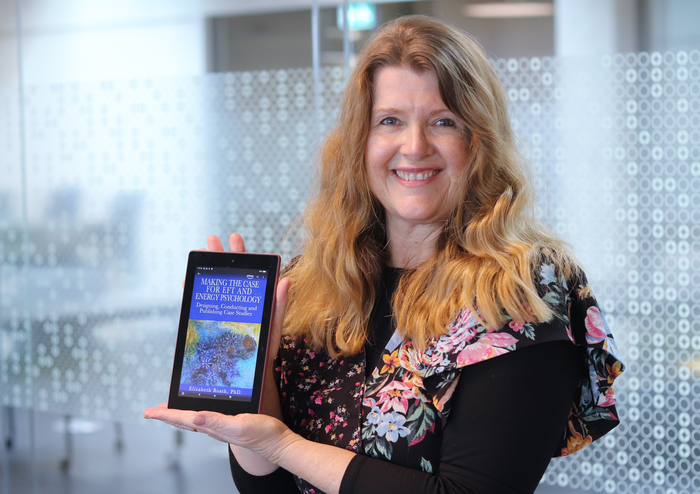A Staffordshire University Professor has published an essential guide to help EFT practitioners share their experiences of how ‘tapping’ is being used to treat people around the world.

Credit: Staffordshire University
A Staffordshire University Professor has published an essential guide to help EFT practitioners share their experiences of how ‘tapping’ is being used to treat people around the world.
Emotional Freedom Techniques (EFT) or ‘tapping’ is a combined somatic and cognitive therapy which thousands of therapists and practitioners worldwide have integrated into their practice. EFT is also a popular self-help technique, used by millions of people to relieve a variety of issues including aches and pains, stress and anxiety, fears and phobias, cravings and addictions, and much more.
Liz Boath, Professor of Health and Wellbeing, has a background in Psychology and is an Accredited Certified EFT Practitioner and a key member of the EFT International Research Committee and EFT Entente.
Her new book Making the Case for EFT and Energy Psychology: Conducting, Writing and Publishing Case Studies provides a practical, step-by-step guide to help EFT and other practitioners design, conduct, write, publish and disseminate case studies.
Professor Boath explained: “Despite the fact that there is a fast-growing body of research on EFT, including meta-analyses, systematic reviews and randomised controlled trials, there are still only sixteen published EFT case studies. One reason for this paucity of case studies is that EFT practitioners are not researchers and so this book aims to bridge this gap by giving practitioners a clear blueprint to follow to enable them to carry out, write and publish their own case studies.
“Another reason is that case studies are often seen as simplistic and descriptive as they appear at the bottom of the hierarchy of evidence, however, they are the solid foundations on which research, theory and practice are built and can act as a catalyst for change.”
Since using EFT to overcome her own fear of spiders, Professor Boath has pioneered research at the University including using EFT to reduce academic stress in students. Along with EFT colleagues from across the globe, she has reviewed evidence and produced guidelines on using EFT for Post-Traumatic Stress Disorder (PTSD).
Professor Boath can often be found caring for her own health and wellbeing by tapping and has even used the technique during her recent cancer treatment.
She said: “I was tapping when I was waiting to go into theatre, I used it following my cancer diagnosis, for my phobia of needles when it came to being anaesthetised and I used it for the pain post-surgery.”
Released last month, the book has received glowing praise from leading figures in the EFT community and is being translated into Dutch and Spanish.
Nick Ortner, author of several texts on tapping and the Tapping Solution App, described the book as “a clear, concise and actionable guide to writing and sharing case studies. As EFT research progresses, these case studies will be an invaluable tool to continue sharing the message. I highly recommend you read this book!”
Dr Peta Stapleton, Clinical and Health Psychologist, and academic from Bond University in Australia, added: “This is a must read for any researcher or clinician in the field who wants to showcase the results and effectiveness of their energy psychology work. The book is AMAZING and should be mandatory reading for EFT and EP trainings. Everyone should read it.”
A Kindle edition of Making the Case for EFT and Energy Psychology: Conducting, Writing and Publishing Case Studies is currently available via Amazon and it will be released in paperback later this year. The Dutch version is released 10 June and the Spanish translation will follow soon.
More information about EFT and lots of free resources can be found on the EFT International Website: https://eftinternational.org/
Notes to Editors
To request an interview with Professor Liz Boath please contact Amy Platts on [email protected] or 07799 341911.




